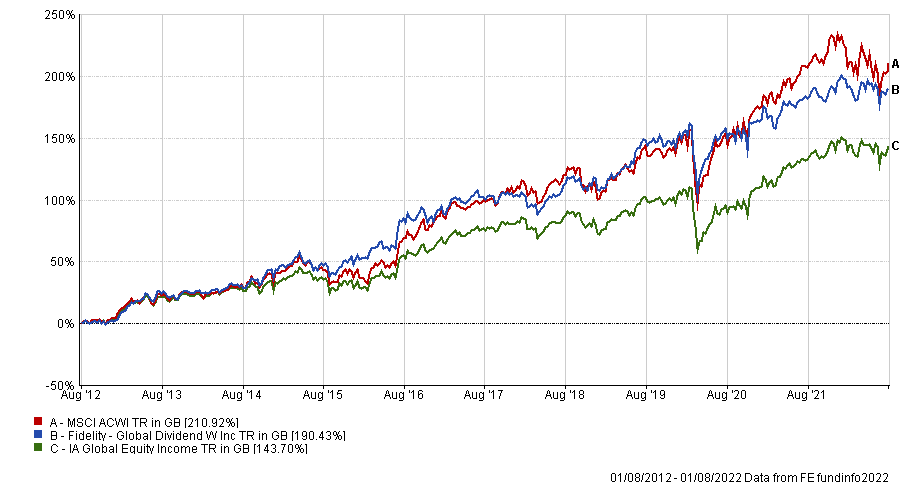Investors have been turning to income funds this year as the highest UK inflation for 40 years bites into savings, with the Fidelity Global Dividend fund being one of the top choices for income investors.
It had the highest volume of inflows than any other portfolio in the IA Global Equity Income sector over the past six months as £773.9m of new money entered the fund, according to FE Analytics, bringing total assets under management (AUM) to £3.1bn.
The fund’s commitment to grow its dividend pay-outs may be an appealing prospect for investors with running at 9.4% and eating away at the purchasing power of their savings.
Fidelity Global Dividend turned 10 years old in February this year and has delivered strong long-term performance over the past decade, making a total return of 190.4%.
Total return of fund vs benchmark and sector over the past 10 years

Source: FE Analytics
This 46.7 percentage point lead on its peer group places it firmly within the top quartile over the past 10 years, but that gap has gradually closed over the years - the sector gained a 1.1 percentage point lead in the past six months as the fund dropped 1.2%.
As more and more fresh money is pumped into the fund, Trustnet asks experts if investors should be following the crowd into Fidelity Global Dividend.
Tom Sparke, investment manager at GDIM, said its short-term decline in performance could be a reasonable trade-off for low volatility.
“It hasn’t put up the best of total return numbers over recent years but it has exhibited a lower degree of volatility than most of its peers, which has provided investors with a smoother path to returns,” he said.
The fund currently ranked within the IA Global Equity Income sector’s top quartile for volatility over the long (10 years), mid (five years) and short-term (six months).
Sparke said that this was due to high exposures in “robust” sectors such as pharmaceuticals and consumer staples, which account for 29.4% of asset allocations, compared to the MSCI ACWI Index’s 20.6%.
The resilience nature of these sectors also helps them increase dividends, even in the difficult markets we’re currently navigating, according to Sparke.
However, he added that other defensive portfolios within the sector such as Vanguard Global Equity Income and Redwheel Global Equity Income are also “attracting much well deserved attention” and are also worth consideration.
Even so, none of these funds have received as many inflows as Fidelity Global Dividend – over the past six months, Vanguard received £51m and Redwheel had £49m of net inflows.
In fact, the second most popular IA Global Equity Income fund, Baillie Gifford Responsible Global Equity Income, still received £329.8m less than the Fidelity offering over the period.
Fidelity Global Dividend’s boost in popularity this year is likely due to investors chasing the success of value portfolios, according to James Calder, research director at City Asset Management.
Growth managers thrived over the past decade as low rates and plenty of free cash supported their investment strategy, but high inflation and tighter monetary policy have turned the tables in 2022.
Calder said: “Markets have reversed with value now in ascendence. It is not uncommon for fund flows to follow recent success – it’s human nature.”
The fund does not contain any of the benchmark’s top 10 stocks in its 50-holding portfolio, and has no exposure to any of the five FAANG companies that dominated global markets over the past cycle.
That being said, Calder expects markets to rotate back towards growth at some point in the future, at which point the fund’s performance will sink.
Despite this outlook, he will continue to hold the fund within his own portfolios because its defensive nature offers a fall-back net when markets decline, much as it has in recent months.
“We understand why we hold it and will continue to do so when out of favour, but I would be lying if I denied there being a warm feeling at recent relative performance,” Calder added.
Sam Buckingham, investment analyst at Kingswood Group, also holds the Fidelity Global Dividend fund and agreed that the high-quality companies contains would be resilient throughout a recession.
Although he has a high conviction for the stock-picking skills of manager Daniel Roberts, who has lead the fund since launch, Buckingham does see a scenario emerging where the fund could underperform.
“The quality nature of the fund results in minimal exposure to the traditional value parts of the market (e.g. energy and materials). Hence, if value continues to outperform then this fund will likely underperform,” Buckingham said.





